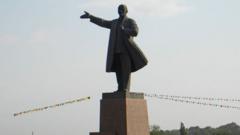NATO Secretary-General Mark Rutte advocates for substantial increases in military budgets from member nations, emphasizing the necessity of a collective defense strategy against the backdrop of Russia's aggression.
NATO Chief Urges Major Military Spending Increases Amid Russian Threat

NATO Chief Urges Major Military Spending Increases Amid Russian Threat
Mark Rutte calls for member nations to commit to 5% of GDP for defense spending to counteract Russian aggression.
NATO Secretary-General Mark Rutte underscored the need for a significant escalation in military budgets during a speech in London on Monday, stressing that member nations must make a “quantum leap in our collective defense.” This comes as the alliance grapples with the implications of Russian aggression and shifts in U.S. military support.
Rutte, who previously served as the Prime Minister of the Netherlands, is advocating for NATO countries to allocate 5 percent of their Gross Domestic Product (GDP) towards military and defense operations. This ambitious target, echoed by former President Donald Trump, aims to alleviate what is perceived as an unfair financial burden currently placed on the United States, which contributes approximately 3.4 percent of its GDP to defense.
As part of his plan, Rutte hopes to solidify this benchmark at an upcoming NATO summit to be held in The Hague on June 24 and 25. Although a timeline for achieving this financial goal has not yet been established, the challenge of meeting such a target is clear, particularly for Britain and its European allies.
Currently, the UK's defense spending stands at 2.3 percent of its GDP, slightly above that of France and Germany, but below the U.S. level. Prime Minister Keir Starmer has pledged to elevate military spending to 2.5 percent by 2027, with further aspirations to reach 3 percent within a decade, contingent on identifying fiscal resources.
Achieving the proposed 5 percent spending level would likely necessitate difficult political compromises, especially as the UK navigates constricted public finances in the aftermath of economic pressures stemming from its ongoing commitments.




















